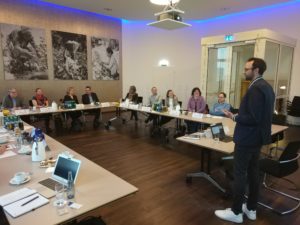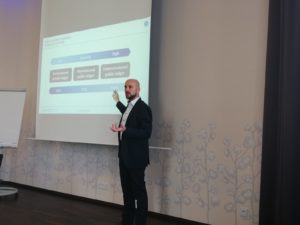 The Bremen Cotton Exchange and the Bremerhaven-based biotechnology company Impetus Bioscience are working jointly on a research project where blockchain technology plays a major role for documentation and data transfer. The project addresses product information collected by the DNA analysis of traded organic cotton. Samples from deliveries will be tested based on scientific testing methods to prove their authenticity. This theme gains increasing relevance in case of arbitration procedures due to doubts of one contracting party with respect to the delivery.
The Bremen Cotton Exchange and the Bremerhaven-based biotechnology company Impetus Bioscience are working jointly on a research project where blockchain technology plays a major role for documentation and data transfer. The project addresses product information collected by the DNA analysis of traded organic cotton. Samples from deliveries will be tested based on scientific testing methods to prove their authenticity. This theme gains increasing relevance in case of arbitration procedures due to doubts of one contracting party with respect to the delivery.
The project is titled “Blockchain for GMO Mediation in Organic Cotton”. It is funded by the European Fund for Regional Development (EFRE). One aim is to develop a blockchain concept tailored to the described purpose. Another target is enlarging the range of DNA testing methods for the raw material cotton in order to develop a private-sector arbitration standard for conflicts. This is where the Bremen Cotton Exchange comes into play. As internationally recognized arbitration the Bremen Cotton Exchange is able to settle conflicts on organic cotton traded all over the world or processed in finished products on the basis of facts.
It is well-known that certified organic cotton does not allow the use of genetically modified seeds or plants. Yet, due to several reasons there is a large risk of contamination with genetically modified organisms (GMO) respectively with genetically modified cotton during the production process. Any contamination is definitely a point of dispute. Since the DNA of GMO cotton is known, it can be disclosed during testing.
The implementation of reliable control mechanisms as well as the definition of verifiable tolerances is therefore mandatory for the Bremen Cotton Exchange and the company Impetus Bioscience. The feasibility of testing random samples within the whole supply chain is on focus. At the same time data integrity is essential.
Blockchain Seminar in the Bremen Cotton Exchange

 Within the framework of this project the Bremen Cotton Exchange hosted a seminar on October 22. The seminar introduced the blockchain technology and its use in supply chains to the project staff as well as to interested professionals from the cotton trade, service and local authorities. Ideas and ways of implementing blockchain technology in business processes were furthermore demonstrated.
Within the framework of this project the Bremen Cotton Exchange hosted a seminar on October 22. The seminar introduced the blockchain technology and its use in supply chains to the project staff as well as to interested professionals from the cotton trade, service and local authorities. Ideas and ways of implementing blockchain technology in business processes were furthermore demonstrated.
The host had invited two blockchain experts for the seminar: Leonard Pust, the founder of BitMoin, and Jan Christoph Ebersbach from the company Chainstep, Hamburg. Leonard Pust imparted knowledge on the basics and functionality of blockchains that are made of fraud and erasure resistant data sets. Blockchains are no more just interesting for the digital currency Bitcoin in case of monetary transactions – as they had been in the past, but also for the exchange of virtual goods of all kinds. Using this technique, the identity of a product can be tracked within seconds at any time during the further production process. Jan Christoph Ebersbach explained the possibilities of implementing this technique in practice by means of examples.
All seminar participants were enchanted by the interesting speeches.
The first important step was taken to achieve the joint target in cooperation with competent partners: the development of a blockchain module that matches the specific requirements of the cotton industry.
Pictures: © Ebersbach/Pust
above: Leonard Pust, BitMoin, with participants
below:Jan Christoph Ebersbach, Chainstep, talking about way to a blockchain
![]()
The project “Blockchain for GMO Mediation in Organic Cotton” is funded by the European Fund for Regional Development (EFRE).

